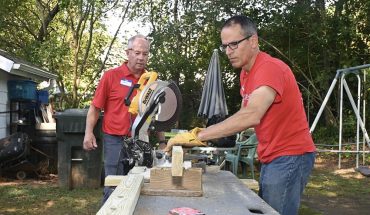These recipients of Thrive NC presented by Blue Cross NC are funding each combat hunger in our area in different ways.
by Rachel Taylor
Not knowing where the next meal will come from is an all too common issue for residents across the Triangle. Food insecurity—a lack of a consistent, reliable source of affordable and nutritious food—affects about 16 percent of Raleigh’s population and one in five children across the state.
The annual Thrive NC presented by Blue Cross NC typically brings together local chefs for a culinary experience that educates North Carolinians on this issue and combats it, too. Each year, proceeds from the Thrive NC festival are donated to various organizations in the Triangle that fight food insecurity. While the 2020 Thrive NC festival, originally scheduled for May 7-8, had to be rescheduled to 2021 due to the COVID-19 public health crisis, they will still be offering these nonprofits the funding they would have earned through ticket sales. (Event-goers also have the option of donating their ticket refund to the NC Restaurant Workers Relief Fund.).
This year the beneficiaries are TABLE, Farmer Foodshare and Urban Ministries of Wake County and Durham. Here’s why they were chosen—and how each is helping in its own way.
Urban Ministries of Wake County: Offering Choice and Guidance
Running the county’s largest client choice food pantry means it’s vital to have a reliable supply of fresh food. Half of the pantry stock at Urban Ministries of Wake County is comprised of fresh produce, frozen meat and other fresh food their clients might not be able to get from other programs, says Carrie Pitts-Densmore, their Media Communications Specialist.
“Our clients can shop for their own food. They are not handed boxes of food,” she says. “They are allowed to come in and shop just like a regular grocery store.”
Last year, the nonprofit was able to serve 29,000 of the estimated 131,000 people who are food insecure in Wake County. The donation from Thrive NC will greatly impact how many more people they can help in the future, Pitts-Densmore says.
Putting healthy, fresh foods into a client’s hands extends beyond the pantry. At the nonprofit’s clinic, doctors are helping the uninsured by offering “food prescriptions” that can improve the health of people with chronic illnesses, like diabetes and heart disease. The “prescriptions” can be filled at the food pantry and from the organization’s garden, which produced 8,000 pounds of produce last year.
TABLE: Growing Healthy Habits
Children tend to be the most vulnerable when it comes to food insecurity. Around 6,000 kids qualify for the free and reduced lunch program in Orange County alone. But what happens when the kids go home? TABLE’s mission is to ensure that children have access to healthy food for every meal.
The nonprofit has a two-part solution to the issue. Its weekend meal backpack program delivers over 700 bags, each containing five to six meals and snacks, to 30 different sites weekly. Its nutrition education program, Snack Chef, brings food education to after-school programs in Chapel Hill and Carrboro. Children are introduced to healthy snacks, like avocado toast, and can bring the recipe and ingredients home to share with family and friends.
“Our goal with both of our programs is to expose children to healthy food,” says Suzanne Tormollen, Director of Community Relations at TABLE. “It’s to encourage them to try new food—especially local, fresh foods—and in doing so help them learn to make better choices and develop healthier eating habits that will last them the rest of their life.”
With the Thrive NC donation, Tormollen estimates TABLE will be able to provide an additional 10,000 meals and 2,000 backpacks to the community. “That’s a huge, huge impact going directly back into our community,” she says.
Urban Ministries of Durham: Stretching Food Budgets
The community café at the Urban Ministries of Durham is open to anyone who is hungry, Director of Development Joe Daly says. That means a hot, free meal three times a day, seven days a week. In addition to hot meals, it hands out bagged meals Monday through Friday to ensure folks can be productive with their day and don’t need to search for another meal.
Additionally, the nonprofit’s shelter—the largest public shelter for single adults in Durham—houses up to 750 people in a typical year. “Our shelter residents will dine in the café, but we also have folks from the community who are just trying to stretch their budget. The community café makes a big difference for them,” Daly says.
Choosing between rent and their next meal is what brings people into the café and food pantry. This year they’ll give out 147,000 pounds of food through the pantry. “We really do see the community café and food pantry as a way to keep people from needing to come into the shelter,” he says. “It can really be a difference maker.”
Farmer Foodshare: Connecting the Dots
Over the past decade, Farmer Foodshare worked to support small-scale and disadvantaged farmers by connecting them with markets to sell their produce, building a state-wide network of farmers and businesses.
Now, the organization is using that network to bring local produce to community organizations. That includes nonprofits—like TABLE—school districts, universities, businesses and restaurants.
“Local growers were coming to share what they’ve grown here in North Carolina and yet, just down the road, often there were food pantries that had never served local food,” the organization’s Director of Development and Communication Kate Rugani says. “It seemed like such a mismatch… wouldn’t it be even better if there were opportunities to bring the two together?”
The goal is to link local farmers and their surrounding community for the betterment of all. “We’ve learned time and time again through our work with community organizations how important it is for people to have a voice in what they’re eating and where their food comes from,” Rugani says. “The food exists, and it exists in spades here in North Carolina—what we can really do is help to connect those dots. It’s exciting work.”






